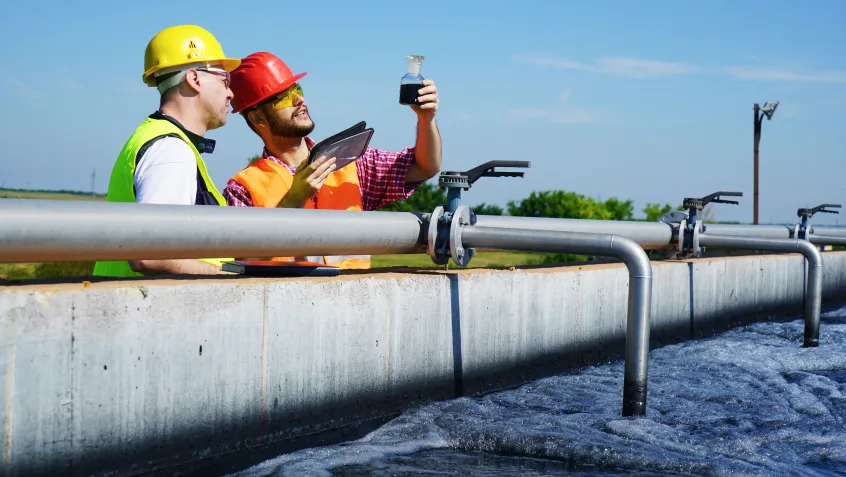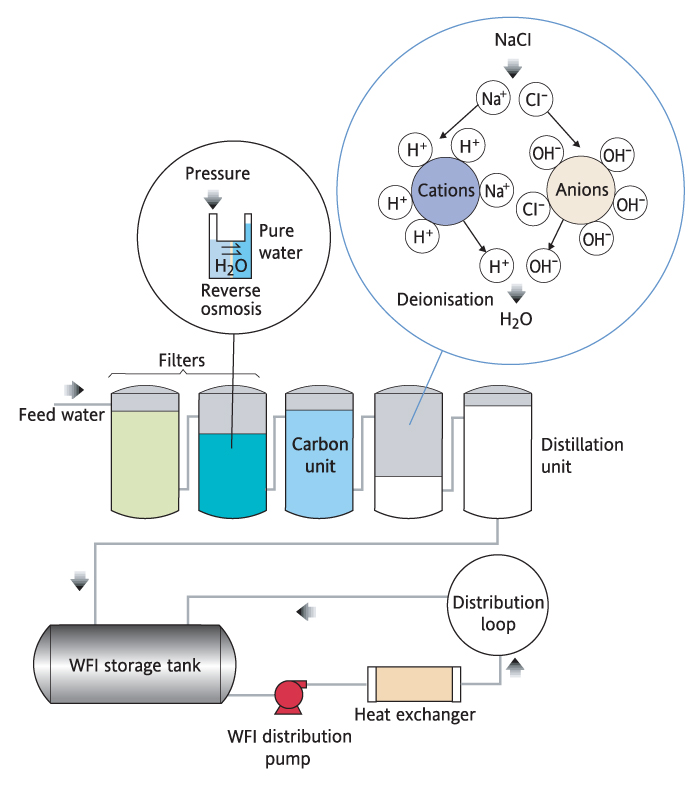Discovering Water Technology Startups: Exactly How They Change Lasting Solutions
Water Technology start-ups are becoming important players in the mission for sustainable services to worldwide water problems. These business take advantage of ingenious modern technologies to boost water performance and monitoring. Their payments attend to pushing obstacles such as shortage and contamination. Nevertheless, regardless of their capacity, they encounter different challenges that might impact their success. Understanding these dynamics clarifies the future of water sustainability and the duty these start-ups may play fit it.
The Importance of Water Technology in Today's World
As worldwide water scarcity intensifies, the significance of water Technology comes to be significantly obvious. Water Technology plays a vital duty in attending to the challenges presented by reducing freshwater sources and boosting demand. It incorporates a broad series of developments, consisting of sophisticated filtration systems, wastewater therapy innovations, and smart watering options. These innovations not only improve the performance of water usage but additionally advertise lasting practices across numerous markets, including farming, sector, and city advancement.
The significance of water Technology expands past source management. It fosters resilience versus environment change effects, such as floodings and dry spells, by providing adaptive solutions for water conservation and management. Additionally, it sustains public wellness by ensuring accessibility to tidy and secure drinking water. As the globe encounters expanding water-related difficulties, the assimilation of sophisticated water innovations is essential for fostering sustainable growth and securing water schedule for future generations.
Cutting-edge Solutions From Water Technology Startups
While typical strategies to water monitoring have offered their purpose, a new wave of water technology start-ups is transforming the sector with innovative options (Water Technology Startups). These companies take advantage of advanced innovations to attend to pushing water problems, such as shortage, contamination, and inefficient distribution. Lots of startups utilize expert system and machine learning to maximize water use and predict need, resulting in even more lasting techniques
In addition, numerous firms focus on developing innovative purification systems that eliminate contaminants and make water safe for consumption. Others discover decentralized water therapy technologies, permitting areas to handle their water sources much more effectively. Moreover, some start-ups are pioneering wise watering options that decrease water waste in agriculture, promoting environmental preservation.
Situation Researches: Effective Water Technology Startups
Numerous water Technology startups have become leaders in addressing global water difficulties with cutting-edge techniques. One notable example is Xylem, which concentrates on water analytics and smart framework to optimize water usage and lower waste. Their services have actually been applied in numerous municipalities, demonstrating considerable enhancements in water monitoring efficiency.
An additional successful startup, Absolutely no Mass Water, has actually developed solar-powered hydropanels that draw out water vapor from the air, giving lasting drinking water in deserts. Water Technology Startups. This Technology has been deployed in several countries, guaranteeing neighborhoods have access to clean water
AquaVenture Holdings operates a diverse profile of water-as-a-service remedies, attending to water scarcity through desalination and wastewater treatment. Their jobs have proven essential in areas encountering extreme water scarcities, showcasing the possibility of ingenious water technologies to develop long lasting, positive impacts. These situation research studies highlight the transformative potential of startups in the water Technology sector.
The Role of Smart Technology in Water Monitoring
Smart Technology plays an important role in modern-day water monitoring by leveraging IoT applications to optimize resource usage. Data analytics boosts effectiveness by offering actionable understandings, while remote tracking services enable real-time oversight of water supply. With each other, these developments change exactly how water is managed, promoting sustainability and operational performance.
IoT Applications in Water
As water scarcity and monitoring challenges intensify around the world, the combination of Internet of Things (IoT) applications has actually emerged as a crucial service in maximizing water resources. IoT Technology assists in real-time monitoring and analysis of water systems, making it possible for much more reliable usage and administration. Sensing units deployed in different water frameworks can track top quality, flow rates, and leak, providing valuable information to stakeholders. This data equips utilities and customers to make educated choices, minimizing waste and improving preservation efforts. Furthermore, wise irrigation systems utilize IoT to optimize water distribution for farming, ensuring that crops obtain the right quantity of water at the right time. Generally, IoT applications are changing standard water monitoring methods, fostering sustainability and resilience in water resource systems.
Data Analytics for Performance
Taking advantage of data analytics is important for enhancing efficiency in water management. Water Technology start-ups are increasingly utilizing sophisticated analytics to optimize resource allowance and lower waste. By analyzing data from different resources, these start-ups can recognize patterns and patterns that inform better decision-making. Predictive analytics can anticipate water need, allowing utilities to adjust supply accordingly, thus reducing surpluses and shortages. Additionally, real-time data handling allows the immediate detection of leakages and inadequacies within circulation systems, significantly decreasing operational prices. Moreover, data-driven understandings equip stakeholders to apply targeted conservation methods, cultivating sustainable techniques. Fundamentally, incorporating data analytics right into water monitoring not only simplifies procedures yet likewise promotes long-lasting sustainability in water resource use.
Remote Monitoring Solutions
While typical water administration systems typically fight with inadequacies, remote tracking solutions are changing exactly how water sources are handled. These innovative modern technologies enable real-time information collection and analysis, allowing stakeholders to monitor water quality, flow prices, and usage patterns from afar. Using sensors and IoT devices, remote surveillance offers prompt insights that assist in positive decision-making. This change not just enhances functional effectiveness yet additionally advertises sustainability by reducing water waste and optimizing resource allowance. Furthermore, remote monitoring systems can determine possible concerns prior to they escalate, consequently decreasing the danger of contamination or facilities failing. As water Technology startups continue to establish these solutions, the industry is positioned for substantial innovations in lasting water administration practices.
Obstacles Dealing With Water Technology Startups
Water Technology start-ups run into substantial obstacles that can prevent their development and success. Key problems consist of safeguarding ample financing, steering through complex regulatory environments, and competing in a crowded marketplace. These challenges need calculated planning and advancement to get rid of.
Funding and Investment Obstacles
Although advancement in water Technology holds tremendous possibility for addressing global obstacles, start-ups in this field often face significant financing and financial investment obstacles. Several financiers stay cautious, viewing the water industry as high-risk as a result of its complicated regulatory landscape and long growth timelines. In addition, startups frequently battle to show immediate productivity, which can prevent potential backers. Traditional financial backing may ignore water technology, preferring industries with quicker returns, such as technology or durable goods. Securing gives and federal government funding can be competitive and lengthy, more making complex financial security. Therefore, numerous ingenious water Technology start-ups find themselves in a precarious placement, calling for innovative financing strategies to navigate these economic obstacles and accomplish their objectives
Regulatory Conformity Issues
Steering regulative conformity is a significant difficulty for start-ups in the water Technology field, as they must come to grips with a myriad of neighborhood, national, and worldwide regulations. These policies often encompass water high quality criteria, environmental management regulations, and safety protocols, which can vary commonly across territories. Start-ups might locate it tough to navigate this complicated landscape, specifically when scaling operations or entering new markets. The costs connected with compliance can be substantial, diverting resources away from advancement and product advancement. Furthermore, delays in obtaining required permits or certifications can prevent growth and market entrance. A robust understanding of governing structures is important for these startups to guarantee lasting operations and avoid prospective legal repercussions.
Market Competitors Characteristics
As water Technology start-ups arise in a competitive landscape, they face countless difficulties that can hinder their development and advancement. Established firms frequently dominate the market, leveraging resources and experience to preserve their positions. Start-ups deal with minimal financing, which limits study and growth capabilities, making it hard to compete on Technology and pricing. In addition, the rapidly progressing nature of water modern technologies demands consistent adjustment, further stressing startup resources. Governing obstacles can make complex market access, as conformity with ecological standards is critical yet pricey. Finally, bring in skilled talent in a niche field offers one more obstacle, as bigger companies might provide even more appealing employment plans. Consequently, these elements develop a complex environment for water Technology start-ups aiming to be successful.

The Future of Water Technology and Sustainability

The future of water Technology will likely concentrate on incorporating expert system and information analytics to enhance water distribution and use patterns. By using real-time information, firms can anticipate shortages and handle resources better. Moreover, lasting practices will certainly become a cornerstone of the sector, motivating round economic climates where water is recycled and treated. Ultimately, the continued development of water Technology will be vital in creating resistant infrastructures efficient in fulfilling the difficulties presented by climate change and population development while promoting ecological stewardship.
Frequently Asked Questions
What Are the Trick Metrics for Examining Water Technology Startups?
Key metrics for reviewing water Technology startups consist of market capacity, scalability, customer procurement costs, income development, modern technology innovation, regulatory compliance, environmental effect, competitive advantage, and group experience, all crucial for establishing long-term stability and success.
Exactly How Can Individuals Support Water Technology Innovations?
Individuals can support water Technology developments by spending in start-ups, promoting for policy changes, taking part in neighborhood efforts, sharing expertise concerning lasting methods, and advertising understanding of water problems with local events and social media.
What Prevail Funding Resources for Water Technology Startups?
Usual financing sources for water tech start-ups consist of financial backing, government grants, crowdfunding platforms, angel investors, and corporate partnerships. These financial avenues help assist in technology and growth in lasting water management technologies.

Which Industries Advantage The Majority Of From Water Technology Advancements?
Industries such as farming, power, manufacturing, and local services benefit significantly from water Technology advancements. These advancements enhance water performance, decrease prices, and promote lasting methods, ultimately adding to environmental preservation and resource monitoring.
Are There Any Type Of Regulatory Difficulties Specific to Water Innovation?
Yes, water Technology faces regulative difficulties, consisting of compliance with ecological criteria, permitting procedures, and differing regional guidelines. These intricacies can hinder technology and slow down the execution of new innovations in the water administration market.
Water Technology start-ups are emerging as essential players in the mission for lasting remedies to global water problems. As worldwide water deficiency increases, the relevance of water Technology becomes progressively noticeable. Others explore decentralized water treatment more info modern technologies, permitting communities to manage their water resources much more successfully. One more effective startup, No Mass Water, has established solar-powered hydropanels that remove water vapor from the air, offering lasting alcohol consumption water in arid regions. Their tasks have proven vital in areas dealing with severe water shortages, showcasing the potential of ingenious water modern technologies to create long-term, favorable effects.